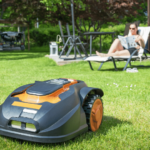China and Southeast Asia have used traditional Chinese medicine (TCM) for thousands of years. Since its origins 2,500 years ago, its practices have changed continuously — and now, high-tech innovations are bringing it to the next level.
Robot masseuse “EMMA” is the work of Singapore-based startup AiTreat, which offers a modern take on the ancient TCM bodywork known as Tui Na.
To relieve pain and promote relaxation, the EMMA (Experience Manipulative Massage Automation) identifies pressure points by using sensors and 3D vision to measure muscle stiffness.

“The principle of traditional Chinese medicine is all about personalized treatments,” says AiTreat founder and CEO Albert Zhang, adding that EMMA is “highly flexible and customizable.”
EMMA can eventually help create affordable, consistent massage treatments that contribute to preventative medicine, a trend Zhang hopes to grow.
AI masseur
The company was founded by Zhang based on his studies in biomedical sciences at Nanyang Technological University (NTU) in Singapore.
Dr. Zhang’s work as a TCM physician gives him firsthand knowledge of how difficult and repetitive it is to diagnose patients and deliver treatment.
Patients laying on the table might not notice any difference between EMMA and a real-life masseuse with modules heated to 38 to 40 degrees Celsius (100 to 104 degrees Fahrenheit), but Zhang is not in favor of robots replacing masseuses. Instead, he says it is more effective to keep massage therapists out of the back-breaking work they do every day, and to let them concentrate on the 10% of their work that is highly skilled, which increases productivity and income for them while lowering the cost for patients.

“One physician can only see one patient at a time, but with EMMA, the physician can operate two robots and see up to four patients simultaneously,” he says.
Zhang says that unlike TCM practitioners who typically spend years training to be certified, EMMA’s AI system is trained with thousands of “data points” — bodies of various shapes, sizes, and ethnicities — to calculate the meridians and the acupoints in every individual.
In addition, Zhang notes that since the robot can detect muscle stiffness through its sensors, it’s able to diagnose patients holistically; knee pain may not only require massaging the knee as it typically is, but also the lower back. According to the company, EMMA can also give sports massages, and the company is working on a medical robot for physiotherapists.
Currently, Zhang said that 11 robots are being used at eight clinics around Singapore, with plans to expand overseas. According to him, practitioners in the United States and China have shown overwhelming interest.
Controversial practice
Traditional medicine was recently accepted as part of the World Health Organization’s (WHO’s) International Classification of Diseases (ICD-11), an annual compendium of disorders, diagnoses, and treatments.
According to the WHO, even though traditional medicine is widely used, it remains unregulated and uninsured, and this recognition could make a difference.
“With ICD-11 traditional medicine chapter being implemented, it will enable easier counting of traditional medicine health services and measuring their type, frequency, effectiveness, safety, quality, outcomes and cost, both nationally and internationally,” the WHO said in an email to CNN.

However, the inclusion of the diagnosis in ICD-11 was accompanied by controversy, as some doctors questioned the scientific evidence and efficacy of the diagnosis. In recent years, some medical professionals have been willing to give TCM a try, however the toxicity of certain herbs, illegal trade of endangered animals, and lack of clinical data have left many unconvinced.
TCM may be able to benefit a great deal from technology in the future. Several studies found that a growing number of researchers are using big data and IoT technology to improve patient diagnostics and test efficacy in the ancient procedure.
Solutions for smartphones
A combination of TCM knowledge and technology, says computer scientist Kun-Chan Lan, could lead to low-cost, non-invasive, and accessible healthcare.
Lan is studying Chinese medicine for his PhD at the China Medical University in Taichung City, Taiwan. He develops smartphone software for healthcare that combines TCM diagnostics with AI.
Several years ago, his mother developed lung cancer, which prompted him to become interested in TCM. The National Center for Complementary and Integrative Health in the United States is currently studying TCM treatments, such as the stimulation of acupoints, for alleviating pain from chemotherapy.
As part of Lan’s research, she developed an artificial intelligence platform that uses sensors already built into smartphones to detect early signs of disease or ill-health using common TCM biomarkers like pulse rhythm, cough sound, and tongue color.

Currently, he is developing three kinds of software: a 3D model of acupoints, a database powered by AI that recognizes herbs, and an app for diagnosing pulses. They are all still in prototype and trial phases.
EMMA apps will not replace experts, but Lan feels that they can reduce the time and amount of money spent on hospital visits by acting as a preventive measure.
As a result of Covid, Zhang claims AiTreat will pursue clinical trials in Germany, China, and Singapore to prove the robotic and massage therapy are effective.
“I think this is only the beginning,” Zhang says. “According to me, the robot will gradually improve, making it more efficient, and helping more people. This robotic technology will get better and better with the support of doctors from around the world.”




